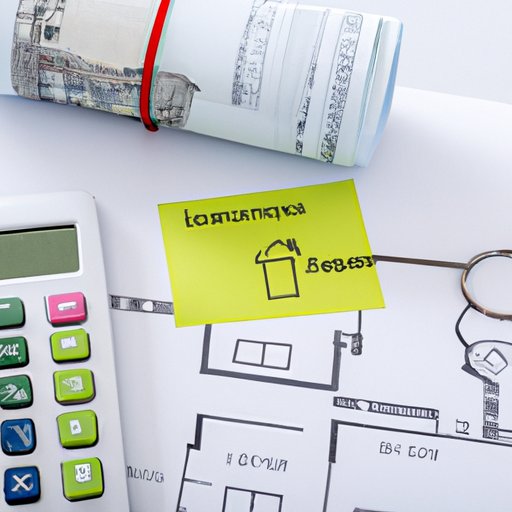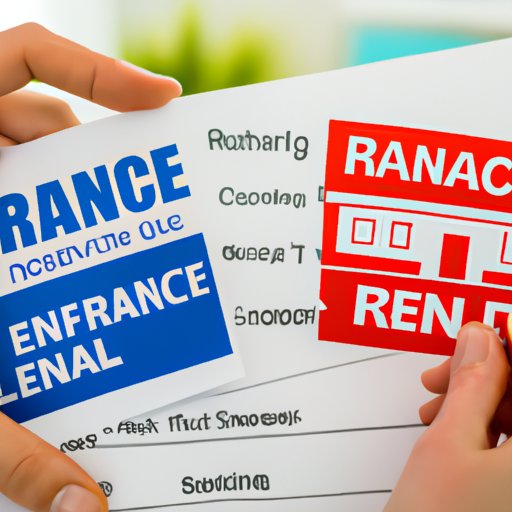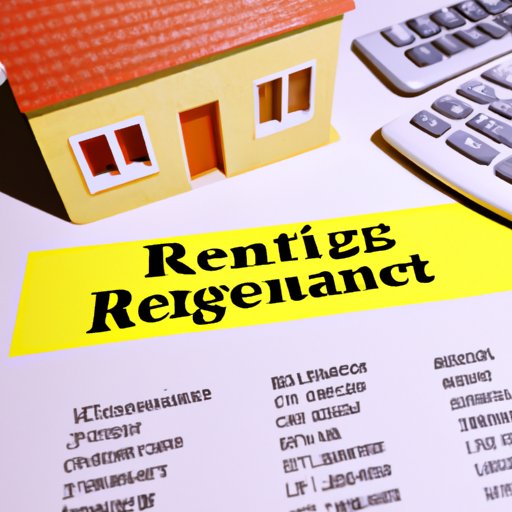Introduction
Refinancing a house is an attractive option for many homeowners. It can help you save money on your monthly mortgage payments and reduce the amount of interest you pay over the life of your loan. But before you decide to refinance, it’s important to understand the costs associated with the process. In this article, we’ll explore how much it costs to refinance a house, the benefits and drawbacks of refinancing, and what you need to know before getting started.

Analyzing the Costs of Refinancing a Home
When you refinance a home, you’ll have to pay various fees and costs in order to complete the process. The exact fees you’ll pay will depend on the lender you choose and the type of loan you get. Here are some of the most common costs associated with refinancing a home:
Closing Costs
Closing costs are fees charged by lenders when you close on a loan. These fees can include title insurance, recording fees, and other miscellaneous charges. Closing costs typically range from 2-5% of the loan amount. Your lender should provide an estimate of the closing costs before you sign any paperwork.
Appraisal Fees
Lenders usually require an appraisal when you refinance a home. This is to make sure that the property is worth the amount of money you’re borrowing. Appraisal fees typically range from $200-$500.
Loan Origination Fees
Loan origination fees are charged by lenders to cover the cost of processing and underwriting your loan. These fees typically range from 0.5-1% of the loan amount. Some lenders may waive the origination fee if you agree to a higher interest rate.
Prepayment Penalties
Some lenders charge a prepayment penalty if you pay off your loan early. This penalty is usually a percentage of the remaining balance of your loan. Make sure to ask about prepayment penalties before signing any paperwork.
Calculating the Break-Even Point for Refinancing a Home
Once you understand the costs of refinancing, you’ll need to calculate the break-even point. This is the point at which the cost savings from refinancing outweigh the costs of the loan. To calculate the break-even point, you’ll need to estimate the cost savings and determine how long it will take to recoup the costs of refinancing.
Estimating the Cost Savings
The best way to estimate the cost savings of refinancing is to compare the current loan terms with the proposed loan terms. Look at the interest rate, loan term, and monthly payment amount to determine how much you will save each month. You can also use an online calculator to estimate the cost savings.
Determining How Long it Will Take to Recoup Refinancing Costs
Once you’ve estimated the cost savings, you can calculate how long it will take to recoup the costs of refinancing. Divide the total cost of refinancing (including closing costs, appraisal fees, and loan origination fees) by the estimated cost savings each month. The result is the number of months it will take to break even.
Exploring the Benefits and Costs of Refinancing Your Home
In addition to the cost savings, there are several other benefits that come with refinancing a home. Here are some of the most common benefits:
Lower Interest Rates
One of the main reasons people choose to refinance is to get a lower interest rate. Lower interest rates mean lower monthly payments and less interest paid over the life of the loan.
Shorter Loan Term
Refinancing can also help you shorten the loan term. This can help you pay off your loan faster and save money on interest payments.
Cash Out Refinancing
If you have built up equity in your home, you may be able to use a cash out refinance to access some of the equity. With a cash out refinance, you can borrow against the equity in your home to pay for home repairs or other expenses.

The Pros and Cons of Refinancing a Home
Refinancing a home can be a great way to save money, but it’s important to consider both the advantages and disadvantages of the process. Here are some of the pros and cons of refinancing a home:
Advantages of Refinancing
- Lower monthly payments
- Lower interest rates
- Shorter loan terms
- Access to cash
Disadvantages of Refinancing
- Closing costs and other fees
- Possibility of prepayment penalties
- May not qualify for the best rates
- Takes time to process the loan
What You Need to Know Before Refinancing a House
Before you refinance a home, there are a few things you should know. Here are some of the most important factors to consider:
Credit Score
Your credit score is one of the most important factors when it comes to refinancing a home. Lenders will use your credit score to determine your eligibility and the interest rate you qualify for. Make sure to check your credit score before applying for a refinance.
Debt-to-Income Ratio
Your debt-to-income ratio is another important factor. This is the ratio of your monthly debt payments to your monthly income. Most lenders prefer a debt-to-income ratio of 36% or less.
Available Equity
If you plan to use a cash out refinance, you’ll need to have enough available equity in your home. Most lenders will allow you to borrow up to 80% of the home’s value.

Comparing Rates to Find the Best Refinancing Deal
Once you’ve determined that you’re eligible for a refinance, it’s time to start comparing rates. Here are some tips for finding the best deal:
Shopping Around for the Best Rate
Don’t be afraid to shop around for the best rate. Different lenders offer different rates, so it pays to compare offers. Ask friends and family for recommendations, and don’t be afraid to negotiate.
Comparing Loan Terms
In addition to the interest rate, it’s important to compare the loan terms. Look at the loan term, prepayment penalties, and other fees to make sure you’re getting the best deal.
Conclusion
Refinancing a house can be a great way to save money, but it’s important to understand the costs associated with the process. Make sure to do your homework and compare rates to find the best deal. If you’re careful and do your research, refinancing can be a great way to save money and pay off your loan faster.
(Note: Is this article not meeting your expectations? Do you have knowledge or insights to share? Unlock new opportunities and expand your reach by joining our authors team. Click Registration to join us and share your expertise with our readers.)
